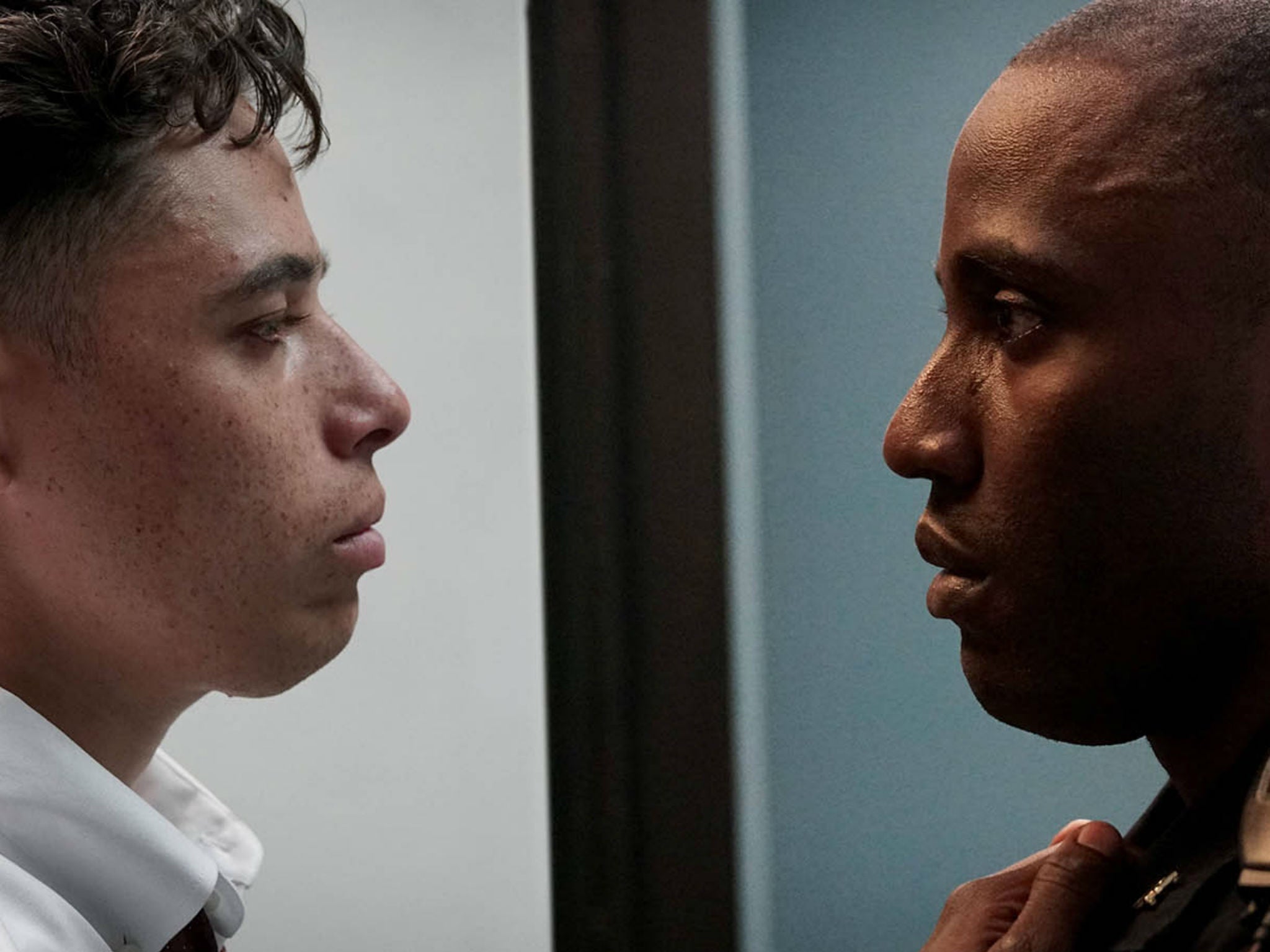Monsters and Men review: An unusually subtle and sensitive story about police brutality
Reinaldo Marcus Green’s delicate, distinctive debut film won the Special Jury Award at Sundance

Director: Reinaldo Marcus Green; Starring: John David Washington, Anthony Ramos, Kelvin Harrison Jr, Rob Morgan, Chanté Adams. Cert 15, 95mins
Bed-Stuy, a neighbourhood in Brooklyn, was the setting for Spike Lee’s explosive 1989 masterpiece Do The Right Thing, and is now the location for Reinaldo Marcus Green’s debut feature. Monsters And Men tackles some of the same subjects as Lee’s film, namely racism and police brutality, but comes at them in a very different way. This is a reflective drama in which three characters react to a killing in the neighbourhood. Structurally, Monsters and Men is closer to Paul Haggis’ Crash or to those late Robert Altman films like Short Cuts, full of different protagonists whose lives overlap. It is very well acted and deals with familiar material in a subtle and sensitive fashion.
A man has been shot by a cop on a street corner. Manny Ortega (Anthony Ramos, Lady Gaga’s sidekick in A Star is Born), a likeable young hustler, has filmed the incident on his cell phone. He agonises over whether or not to post his footage online. Black police officer Dennis (played by the brilliant young actor John David Washington, star of Lee’s BlacKkKlansman) has to decide whether to put his career at risk by exposing his corrupt white colleagues. Young high school athlete Zyrick (Kelvin Harrison Jr) faces a similar dilemma: his father, a cop, is pushing him to pursue a career as a pro baseball player but he yearns to join the campaign against the killing.
Plot wise, Monsters and Men seems very routine. Characters have faced these kinds of decisions in countless other police procedural dramas. It isn’t news, either, that there are rogue elements among the New York cops in the 74th precinct. But none of this lessens the impact of the drama.
The film opens in utterly chilling fashion with Dennis in plain clothes driving in his car, listening to music. We see his reflection in his mirror. Then, ominously, the director shows a police car looming behind him. The sight of it is enough to induce dread. Sure enough, he is pulled over.
Dennis is a young, ambitious, middle-class cop with an affluent lifestyle. He is also devoted to his job and reluctant to turn whistleblower. There is one very telling scene in which he and his wife have friends for dinner. The friends question why he hasn’t done more about the killer on the force. Dennis reacts defensively and with extreme self-righteousness. “One cop goes too far and now we are all guilty,” he protests.
This is a rare cop movie in which machismo is kept to a minimum. Green fills the film with close-ups of his three main protagonists looking anguished as they try to make sense of the random act of violence that has thrown all their lives off balance. The director is as interested in family relationships as in events on the streets. Much of the story unfolds indoors, in the homes of the three main characters. Aside from the shooting, seen fleetingly in Manny’s cell phone footage, there is little direct violence. What does happen again and again is low-level harassment. For no obvious reason, the cops will stop and search passers-by, forcing them to unpack all their possessions and then sending them on their way with a “good day.” The cops also react in a predictably heavy handed way to street protests.
Films to look out for in 2019
Show all 15Writer-director Green probes away at the relationships between husbands and wives, fathers and sons. Zyrick’s policeman father is desperate to see him succeed as a baseball player. The dad takes an obvious, vicarious pleasure in the boy’s successes, fawning over the scouts and coaches who seem to be offering his son a way into the big league. “Cities are going to keep burning,” is his response to the chaos around them. As he sees it, the violence and corruption will always be there. Zyrick should ignore it and concentrate on his sporting career instead.
At times, the storytelling feels tentative, and the ending is deliberately very low key. The film shies away from the kind of confrontations that a Spike Lee movie would relish. You don’t find Public Enemy’s “Fight The Power” blasting away on the soundtrack here.
By always placing the emphasis on the personal experiences of his three leads rather than the bigger political picture, Green risks straining out the anger and indignation that you’d expect to find at the heart of the drama. He also goes out of his way to be balanced in his portrayal of the police. Several minutes are given over to the funeral of a fallen officer and to footage of his grief-stricken comrades. Although there are racist thugs on the force, there are also men like Dennis who are utterly dedicated to the job. It all risks getting a bit corny.
But what makes Monsters and Men such a distinctive debut feature, and explains why it won the Special Jury Award at Sundance for outstanding first feature, is the insightful and delicate way that Green makes his points. For example, when Dennis’s young son wants to wear one of his police department sweat shirts to school for “parents’ appreciation day”, Dennis tries to forbid it. At moments like these, we realise that he feels as much shame as pride about his choice of profession.
Subscribe to Independent Premium to bookmark this article
Want to bookmark your favourite articles and stories to read or reference later? Start your Independent Premium subscription today.

Join our commenting forum
Join thought-provoking conversations, follow other Independent readers and see their replies